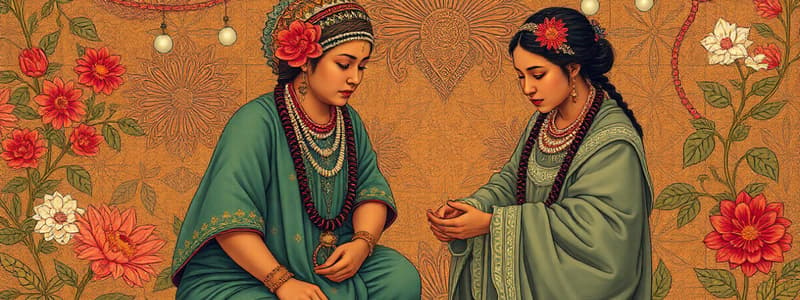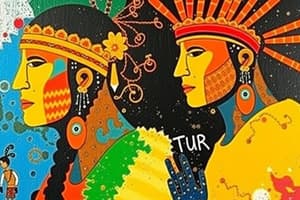Podcast
Questions and Answers
The Nacirema's belief that the human body is inherently prone to weakness and disease primarily influences what aspect of their culture?
The Nacirema's belief that the human body is inherently prone to weakness and disease primarily influences what aspect of their culture?
- Their agricultural practices, which focus on cultivating foods believed to enhance physical well-being.
- Their economic system, which prioritizes the accumulation of resources to combat illness.
- Their extensive ritual practices centered on the body's appearance and health. (correct)
- Their political structure, where leaders are chosen based on their physical strength and health.
What role do medicine men play in Nacirema society concerning the acquisition of charms and magical potions?
What role do medicine men play in Nacirema society concerning the acquisition of charms and magical potions?
- They oversee the distribution of potions at the Water Temple.
- They determine the ingredients for the potions and write the instructions in a secret language. (correct)
- They directly provide the magical potions to their clients after receiving payment.
- They serve as intermediaries between the herbalists and the Water Temple priests.
What is the primary purpose of the daily mouth-rite ritual among the Nacirema, involving hog hairs and magical pastes?
What is the primary purpose of the daily mouth-rite ritual among the Nacirema, involving hog hairs and magical pastes?
- To maintain the cleanliness and aesthetic appeal of their homes.
- To prevent tooth decay, gum bleeding, and social abandonment. (correct)
- To enhance their physical strength and endurance for daily tasks.
- To ensure their crops are blessed with a bountiful harvest.
How does the Nacirema attitude towards the latipso ceremonies reflect their cultural beliefs, despite the high mortality rate?
How does the Nacirema attitude towards the latipso ceremonies reflect their cultural beliefs, despite the high mortality rate?
Why do the Nacirema consider visits to the holy-mouth-man and the associated 'ritual torture' as essential?
Why do the Nacirema consider visits to the holy-mouth-man and the associated 'ritual torture' as essential?
In Nacirema culture, how is the importance or status of a household often determined?
In Nacirema culture, how is the importance or status of a household often determined?
What does the daily ritual of mingling holy waters in a font beneath the charm-box signify in Nacirema households?
What does the daily ritual of mingling holy waters in a font beneath the charm-box signify in Nacirema households?
Considering the Nacirema's belief in a relationship between oral and moral characteristics, what outcome is expected from the ritual cleansing of the mouth for children?
Considering the Nacirema's belief in a relationship between oral and moral characteristics, what outcome is expected from the ritual cleansing of the mouth for children?
What can be inferred about the Nacirema's economic system from the description of their ritual practices?
What can be inferred about the Nacirema's economic system from the description of their ritual practices?
How might an outsider interpret the Nacirema's 'horror of and fascination with the mouth' in relation to their social structure?
How might an outsider interpret the Nacirema's 'horror of and fascination with the mouth' in relation to their social structure?
What is the significance of the 'ancient and secret language' used by the medicine men when prescribing ingredients for charms?
What is the significance of the 'ancient and secret language' used by the medicine men when prescribing ingredients for charms?
What does the text imply about the Nacirema's understanding of disease and health, based on their rituals?
What does the text imply about the Nacirema's understanding of disease and health, based on their rituals?
Why might the Nacirema be described as a 'magic-ridden people' in the conclusion of the text?
Why might the Nacirema be described as a 'magic-ridden people' in the conclusion of the text?
How does the Nacirema's willingness to give 'rich gifts' to the guardians of the temples highlight a potential social inequality?
How does the Nacirema's willingness to give 'rich gifts' to the guardians of the temples highlight a potential social inequality?
Considering the Nacirema's geographic location, which spans from North America to the Antilles, what does this suggest about the uniformity of their cultural practices?
Considering the Nacirema's geographic location, which spans from North America to the Antilles, what does this suggest about the uniformity of their cultural practices?
Flashcards
Nacirema
Nacirema
A North American group whose culture revolves around a market economy and ritualistic activities focused on the human body.
Core Nacirema Belief
Core Nacirema Belief
The belief that the human body is naturally ugly, weak, and prone to disease.
Shrine
Shrine
A structure in each household dedicated to rituals aimed at averting the body's natural tendencies toward ugliness, weakness, and disease.
Charms and Potions
Charms and Potions
Signup and view all the flashcards
Medicine Men
Medicine Men
Signup and view all the flashcards
Herbalists
Herbalists
Signup and view all the flashcards
Cleansing Rite
Cleansing Rite
Signup and view all the flashcards
Latipso
Latipso
Signup and view all the flashcards
Oral Obsession
Oral Obsession
Signup and view all the flashcards
Mouth-Rite
Mouth-Rite
Signup and view all the flashcards
Holy-Mouth-Man
Holy-Mouth-Man
Signup and view all the flashcards
Study Notes
- The Nacirema are a poorly understood North American group.
- They live between the Canadian Cree, the Yaqui and Tarahumara of Mexico, and the Carib and Arawak of the Antilles.
- Tradition states that they came from the east.
- Nacirema culture is characterized by a highly developed market economy in a rich natural habitat.
- A considerable portion of their day is spent in ritual activity focused on the human body.
- The appearance and health of the body is a major concern in the people’s belief.
Core Beliefs
- The main belief underlying their ritual activity is that the human body is ugly and prone to weakness and disease.
- Ritual and ceremony are seen as the only way to avert these characteristics.
- Every household has one or more shrines devoted to this purpose.
- More powerful individuals have several shrines, and the grandeur of a house is often determined by the number of ritual centers it has.
Shrines
- The focal point of the shrine is a charm-box built into the wall.
- The box contains charms and magical potions believed to be essential for survival.
- These preparations are obtained from specialized practitioners.
- The most powerful practitioners are the medicine men, who are rewarded with large gifts.
- Medicine men decide on potion ingredients and write them down in an ancient and secret language understood only by them and herbalists.
- Herbalists provide the required charms for another gift.
- Beneath the charm-box is a small font.
- Family members bow before the charm-box, mingle holy water in the font, and perform a cleansing rite.
- Holy water is secured from the Water Temple, where priests conduct elaborate purification ceremonies.
Latipso (Temple)
- Medicine men have an imposing temple, or latipso, in every community.
- Elaborate ceremonies for treating very sick patients are performed at the latipso.
- These ceremonies involve the medicine man and assistants in distinctive costumes and headdresses.
- Latipso ceremonies are so harsh that many patients do not recover.
- Sick adults are willing to undergo the ritual purification if they can afford it.
- Guardians of many temples require a rich gift before admitting a client.
Oral Obsession
- The Nacirema have an unrealistic horror of and fascination with the mouth.
- The condition of the mouth is believed to have a supernatural influence on social relationships.
- They perform rituals of the mouth to prevent teeth from falling out, gums from bleeding, jaws from shrinking, and friends from deserting them.
- They believe there is a strong relationship between oral and moral characteristics.
- A ritual cleansing of the mouth for children is supposed to improve their moral character.
- The daily body ritual includes a mouth-rite involving inserting a bundle of hog hairs into the mouth with magical pastes and moving it in a formalized manner.
- They visit a holy-mouth-man once or twice a year.
- These practitioners use augers, awls, probes, and prods.
- The use of these items in removing the evils of the mouth involves almost unbelievable ritual torture of the client.
- The holy mouth-man enlarges any holes created by decay in the teeth and puts magical materials into these holes.
- If there are no naturally occurring holes, sections of teeth are gouged out to apply the supernatural substance.
- The purpose of these religious functions is to arrest decay and to draw friends.
Conclusion
- The Nacirema are a magic-ridden people.
- It is hard to understand how they have managed to exist so long under the burdens they have imposed upon themselves.
Studying That Suits You
Use AI to generate personalized quizzes and flashcards to suit your learning preferences.
Description
Explore the fascinating Nacirema culture, a North American group with unique body-focused rituals. Their core belief centers on the human body's ugliness and vulnerability, driving daily ritualistic activities. Shrines in households reflect their devotion to averting weakness and disease.





